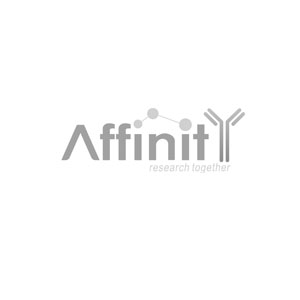TNFRSF6B Antibody - #DF6114
| Product: | TNFRSF6B Antibody |
| Catalog: | DF6114 |
| Description: | Rabbit polyclonal antibody to TNFRSF6B |
| Application: | WB IHC IF/ICC |
| Reactivity: | Human, Mouse |
| Mol.Wt.: | 33kDa; 33kD(Calculated). |
| Uniprot: | O95407 |
| RRID: | AB_2838081 |
Product Info
*The optimal dilutions should be determined by the end user.
*Tips:
WB: For western blot detection of denatured protein samples. IHC: For immunohistochemical detection of paraffin sections (IHC-p) or frozen sections (IHC-f) of tissue samples. IF/ICC: For immunofluorescence detection of cell samples. ELISA(peptide): For ELISA detection of antigenic peptide.
Cite Format: Affinity Biosciences Cat# DF6114, RRID:AB_2838081.
Fold/Unfold
DcR3; Decoy receptor 3; Decoy receptor for Fas ligand; DJ583P15.1.1; M68; M68E; OTTHUMP00000031583; TNF6B_HUMAN; TNFRSF6B; TR6; Tumor necrosis factor receptor superfamily member 6B; Tumor necrosis factor receptor superfamily member 6b decoy; UNQ186/PRO212;
Immunogens
Detected in fetal lung, brain and liver. Detected in adult stomach, spinal cord, lymph node, trachea, spleen, colon and lung. Highly expressed in several primary tumors from colon, stomach, rectum, esophagus and in SW480 colon carcinoma cells.
- O95407 TNF6B_HUMAN:
- Protein BLAST With
- NCBI/
- ExPASy/
- Uniprot
MRALEGPGLSLLCLVLALPALLPVPAVRGVAETPTYPWRDAETGERLVCAQCPPGTFVQRPCRRDSPTTCGPCPPRHYTQFWNYLERCRYCNVLCGEREEEARACHATHNRACRCRTGFFAHAGFCLEHASCPPGAGVIAPGTPSQNTQCQPCPPGTFSASSSSSEQCQPHRNCTALGLALNVPGSSSHDTLCTSCTGFPLSTRVPGAEECERAVIDFVAFQDISIKRLQRLLQALEAPEGWGPTPRAGRAALQLKLRRRLTELLGAQDGALLVRLLQALRVARMPGLERSVRERFLPVH
PTMs - O95407 As Substrate
| Site | PTM Type | Enzyme | Source |
|---|---|---|---|
| R284 | Methylation | Uniprot | |
| R290 | Methylation | Uniprot | |
| R295 | Methylation | Uniprot |
Research Backgrounds
Decoy receptor that can neutralize the cytotoxic ligands TNFS14/LIGHT, TNFSF15 and TNFSF6/FASL. Protects against apoptosis.
Secreted.
Detected in fetal lung, brain and liver. Detected in adult stomach, spinal cord, lymph node, trachea, spleen, colon and lung. Highly expressed in several primary tumors from colon, stomach, rectum, esophagus and in SW480 colon carcinoma cells.
Restrictive clause
Affinity Biosciences tests all products strictly. Citations are provided as a resource for additional applications that have not been validated by Affinity Biosciences. Please choose the appropriate format for each application and consult Materials and Methods sections for additional details about the use of any product in these publications.
For Research Use Only.
Not for use in diagnostic or therapeutic procedures. Not for resale. Not for distribution without written consent. Affinity Biosciences will not be held responsible for patent infringement or other violations that may occur with the use of our products. Affinity Biosciences, Affinity Biosciences Logo and all other trademarks are the property of Affinity Biosciences LTD.
